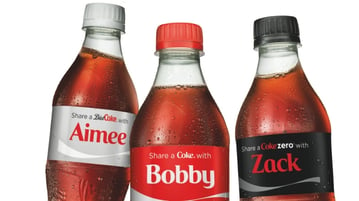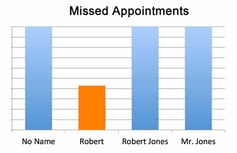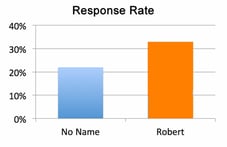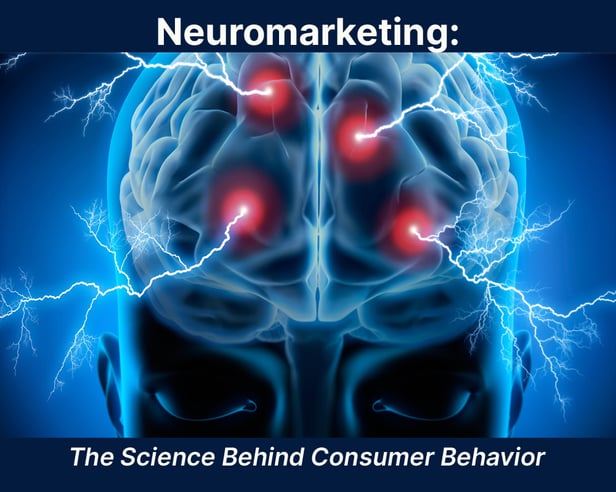Abraham Lincoln. Winston Churchill. Rosa Parks. Albert Einstein. Martin Luther King. Janice Joplin. Amelia Earhart. Barack Obama. Donald Trump. Romeo. Juliet. (Insert your name here.)
There are 7.9 billion people on planet earth. That’s 7,900,000,000 names. Yet, to each of us, one's name is uniquely personal.
Brands are catching on and using the power of personalizing marketing messages to not only capture customers' attention but also to try to connect with them in a way they will remember. Most expert marketers are now going as far as to say that personalized marketing is the future of marketing. According to a survey by Infosys, 86% of consumers say that personalization has some impact on what they purchase; and one quarter admit personalization ‘significantly influences’ their buying decisions.
 Coca-Cola used personalization to launch its Share A Coke campaign, which involved printing
Coca-Cola used personalization to launch its Share A Coke campaign, which involved printing
common names on Coke bottles to attract more millennials. The labels—which also included warm-and-fuzzy terms like "Friends,'' "BFF,'' and "Family''—were launched in 2014. The idea was to get consumers to buy personalized bottles and cans not just for themselves but also for friends and family. The "Share a Coke'' campaign was such a hit that it reversed a decade-long decline in U.S. Coke consumption.
So, what is it about seeing your name in an email or on a Coke bottle that draws you in? It’s simple. Customers don't value the brand; they value the experience they have with the brand. A more personalized experience makes the brand more meaningful and memorable. Isn’t that the holy grail of brand identity? Meaningful and memorable?
“Remember that a person’s name is to that person the sweetest and most important sound in any language.” - Dale Carnegie's sixth principle in “How to Win Friends and Influence People."
Authors, Robert Cialdini, Steve Martin, and Noah Goldstein share another personalization study in their book, The Small BIG. Researchers analyzed a simple change to text message appointment reminders from doctor’s offices. Simply adding the first name to the message cut the no-shows by 57%.
Another experiment showed that adding the recipient’s first name to a text message boosted the response rate for collections, too – an increase of 43%. That simple little change generated a big return.
Starbucks Strikes Gold in the Human Social Experience
-
Status is about relative importance to others – asking for your name instead of giving you a receipt with an order number immediately raises your status.
-
Certainty concerns being able to predict the future – writing your name on the cup right there in front of you gives you a sense of certainty that a barista is going to prepare your cup of java just how you want it.
-
Autonomy provides a sense of control over events – having the freedom to wander the store while you listen for your name to be called meets your need for autonomy.
-
Relatedness is a sense of safety with others, of friend rather than foe – that smiling employee who delivers a personalized cup of goodness could almost be your friend, right?
-
Fairness is a perception of fair exchanges between people – the experience begins and ends with a personal exchange that involves your name.










